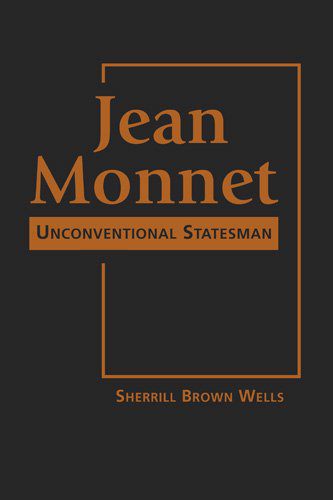Jean Monnet
Unconventional Statesman
This concise political biography of Jean Monnet explains how a brandy salesman from a small provincial French town became one of the most influential European statesmen of the 20th century. He never held elective office, never joined a political party, and never developed any significant popular following in his own country. Yet this Frenchman not only had a major impact on European politics and transatlantic relations, especially between 1945 and 1954, but was the single most important architect of European integration. It also shows how Monnet developed close friendships with a series of American leaders and how these Americans helped him in the effort to create a revived and integrated Europe. This book demonstrates the significant role that this entrepreneurial internationalist played in the reconstruction of France, Franco-German reconciliation, the creation the European Union, and the construction of the transatlantic community in the post-second World War era.
Available for purchase here:
Lynne Rienner Publishers or Amazon- eBook available at the Lynne Rienner Publishers
Scholarly reviews of Jean Monnet: Unconventional Statesman
For the most recent reviews of Jean Monnet: Unconventional Stateman and Michael Geary's Enlarging The European Union: The Commission Seeking Influence, 1961-1973, see the following link H-Diplo Round Table Review. It includes reviews by four scholars and the authors’ responses.
"This richly documented biography offers a captivating view of the visionary and entrepreneurial statesman Jean Monnet. Deftly interwoven into the narrative is first-hand testimony from memoirs and interviews that highlight the interpersonal genius of this midwife of European integration." —George Sheridan, University of Oregon
"A compelling and concise new biography of the father of all Fathers of Europe.... There is a lot to learn from this book."—Yannis Karagiannis, Institut Barcelonad’Estudis Internacionals, in the summer 2012 issue of the EUSA Review
“It’s a fine study of an extraordinary man. You have succeeded in compressing his almost unbelievable life and career into a clear and digestible, albeit critical, summary, and you bring the man alive with deft strokes of the pen. It is difficult to believe, as you make clear, that a single man could have known everyone in the world, made his way among them skillfully, pulled rabbits out of the hat every step of the way, and changed the western world in the process.” - James M. Banner, Jr., Washington, DC
In her short classic biography, Wells examines a figure who is controversial in France and poorly known in Europe. She attempts to explicate the life of an exceptional man whose legend surpasses the man. This book reminds us once again that the Americans believe more in Europe that the Europeans themselves. [Paraphrase]. - Bertrand Vayssière, University Toulouse, in Relations Internationales, issue 158, Summer (July-September), pages 147-149.
Written for scholars as well as a broader audience, Wells places Monnet in the historical context of the 20th century. By utilizing her many interviews with Monnet’s colleagues, Wells gives the reader a better understanding motives of Monnet and the lesser known founders behind their efforts to unite Europe through economic integration. [paraphrase] - Gergely Fejérdy, Maître des conferences, Université Catholique Peter Pazmany, Budapest in The Journal of European Integration History, Volune One, 2014.
“Europe’s Father,” the initiator of the Schuman Plan and founder of the German-French interest community, has already been the subject of two comprehensive biographies, one French and one British. What was missing was a summarizing and not all too exhaustive biography of this French politician. With her “political biography” of Monnet, the George Washington University historian Sherrill Brown Wells seeks to close this gap based on sources and the latest research.” - Translation of Klaus Schwabe, Das Historisch-Politisch Buch 61, 2 (2013).
